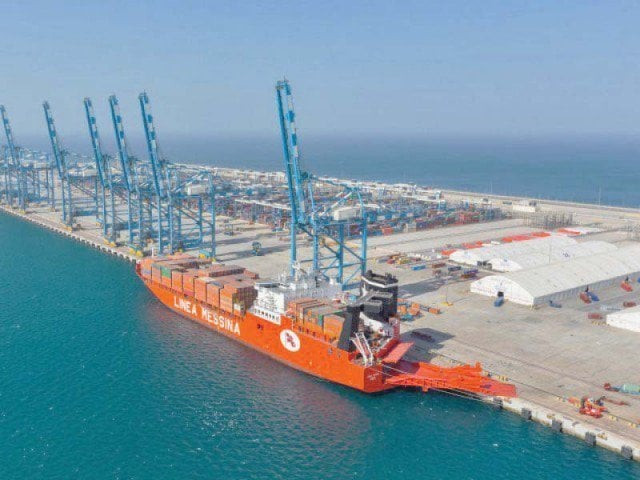CPEC and Gwadar Port – a different perspective
Strategy should be devised to turn around economy with the help of CPEC

Strategy should be devised to turn around economy with the help of CPEC.
PHOTO: FILE
The fascinating façade of the mountains darkens as the sun turns into a speck vanishing into the horizon. Our topic today was Gwadar Port.
How come that the Chinese got interested in Gwadar? My Chinese friend who then had an uncle in the hierarchy of the Chinese Communist Party looks into my eyes, perhaps with an expression of my ignorance, and replies: The East and South China Sea is all controlled by the US, Taiwan, Japan, South Korea, the Philippines, etc. A war may not be imminent but there is an obvious possibility of an economic war or a blockade.
In case there is a blockade on the eastern side of China, there has to be an alternative route and that is only through Pakistan from where warm waters of the Gulf can be reached at Gwadar. This was the birth of CPEC.
To avert a World War III, the US together with a conventional army and the Cold War started developing an army of economic hitmen like John Perkins to undermine the countries where war is not a favourable option. A same strategy is now being followed also by other powerful nations in the world towards weaker nations. Not only the US, but economies of other powerful nations also revolve around the sale of arms. This leads to pitting wars primarily between Muslim nations to sell them military hardware on the one hand and weaken their economies.
The recent example of the US partitioning the rest of the Arab world with Qatar, scaring the Saudis for their kingdom to be at stake if they did nothing about Iran and therefore the sale of $360 billion of military hardware that in turn brings a turnaround to the US economy.
After the fall of the Soviet Union, China may be the only country that can maintain a check and balance in Southeast Asia and therefore a serious threat to the US.
The closed China started opening to the rest of the world around 1993. The Capitalist block knowing the huge potential that awaited them in the Chinese market started opening offices in China.
With it came manufacturing or assembling of western products in China where it was much cheaper to be produced. This strategy backfired where China grabbed the technology and the knowhow and the Capitalist countries started losing jobs for their incumbents in their own countries.
This was the first step towards triggering an economic war that has reached its verge where the US imposed heavy tariffs on Chinese goods and China is gradually becoming dominant grabbing market economies in the rest of the world leaving its footprints all over the globe.
China kills two birds with one stone. In the Xinjiang province, which is predominantly Muslim, the Muslim population had to be marginalised.
Shifting of the industrial base from other parts of China to Xinjiang would mean influx of population from other parts of China and therefore reducing the threat of Islamization in the province.
Furthermore, it was not possible or feasible for Chinese goods produced in Xinjiang to be transported all the way to eastern border ports for shipment and therefore the only option, Gwadar Port and CPEC and a road connecting Kashgar to Gwadar.
Chinese envoys brush aside ‘misconceptions’ about CPEC
Shifting of an industrial base from China to Pakistan helps in overcoming the US tariffs and brings ease in terms of exports to the rest of the world. Rice is a staple diet in China. Just imagine feeding rice to around 1.4 billion people every day, China needs an agriculture base and therefore the Chinese interest in agriculture in Pakistan.
CPEC is more a need for China rather than Pakistan but so unfortunate that Pakistan carries the begging bowl to China for loans that has already become impossible to repay.
The Chinese by nature are very tough negotiators. Instead, it should have been a 40-year contract where Pakistan should have charged enormous sums against facilitating China to have access to the warm waters of the Gulf to cover the Middle East and the western markets with goods produced in Xinjiang transported at a much cheaper cost through Gwadar Port.
The US having a tendency of not tolerating an economic or military imbalance is not very happy with the arrangement of CPEC. The economic war has already been triggered between the US and China by raising tariffs, but at the end of the day, it seems that China will be the winner.
Number of Chinese arriving in Pakistan increasing due to CPEC
This could also be one of the reasons of a proxy war between vested interests within Pakistan with emphasis on the Balochistan province.
Maybe there is still time where strategists in Pakistan formulate a strategy to work towards the interest of their own country to gain out of this one-time opportunity of capitalising on CPEC by bringing a turnaround in the economy of the country presently in a state of despair.
Don’t forget gentlemen at the helm of affairs that opportunity knocks only once.
The writer is former deputy managing director of Saindak Copper Gold Project
Published in The Express Tribune, October 29th, 2018.
Like Business on Facebook, follow @TribuneBiz on Twitter to stay informed and join in the conversation.



















COMMENTS
Comments are moderated and generally will be posted if they are on-topic and not abusive.
For more information, please see our Comments FAQ